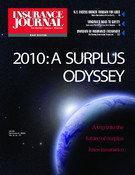As the wheel that sets 2006 auto insurance rates in Massachusetts begins spinning, there is no doubt it will be pointing at a negative number when it comes to rest in about two months.
The real mystery is just how negative that number will be in mid-December when Insurance Commissioner Julianne Bowler announces the state-set rates for next year.
With claims for accidents, injuries, thefts and glass repairs all down, and the war against fraud paying dividends, auto insurers themselves have acknowledged for the first time in decades that rates should go down, not up. The proposal from the industry’s Automobile Insurers Bureau of Massachusetts calls for a 0.1 percent rate decrease, or about $4 million reduction statewide.
Barring changes in purchasing patterns, the estimated average for 2006 would be $1,089 if the AIB recommendation is approved. The average premium nationwide is about $870.
Daniel Johnston, president of AIB, credited a drop in claims across the board and successful anti-fraud actions in particular for holding down rates.
In Lawrence, where the industry has worked with officials to combat serious claims fraud, claims are down significantly, by some 60 percent, or more than $28 million. Johnston attributed the improvement to the work of insurance company anti-fraud efforts and an anti-fraud task force comprised of the Insurance Fraud Bureau of Massachusetts and the Lawrence Police Department as well as the Essex County District Attorney and the Attorney General.
According to Johnston, this is the first time in recent memory that the automobile insurance industry has asked for a decrease in rates. That hasn’t stopped the state from cutting them, however. Since 1995, auto insurance rate levels in the state have gone down 17 percent. Over the same decade, there has been a 17 percent increase in the number of insured vehicles on the state’s roads.
“Claims are still high but are way down. The anti-fraud initiative is paying dividends,” Johnston told Insurance Journal. He said the industry has taken its anti-fraud task force to other high claims communities in hopes of repeating the Lawrence success and the effort appears to be working. Losses have gone down in Springfield/Holyoke, Brockton, Lynn, Lowell and Boston as a result.
Attorney general and agents
Attorney General Tom Reilly agrees with the industry that rates should go down but Reilly thinks they should fall by a lot more than the fraction proposed by carriers. He is preparing to file that rates be cut by at least 10 percent.
Reilly, who is running for governor, said his office has plenty of evidence to back his recommendation. “We have enough right now to blow their number right out of the water,” he told the Associated Press. “We’re going to keep on digging until we can get every penny.”
The third party to offer a suggestion, the State Rating Bureau, traditionally waits until after the attorney general before revealing its recommendation. Its recommendations tend to fall in-between those of the AG and the industry.
The state also sets the amount insurers can spend on agent commissions. Agents are asking for an 18 percent boost in commissions for 2006, according to the filing by the Massachusetts Association of Insurance Agents. If approved, the request would raise the average commission from $119.50 to $141.23.
The MAIA request for 2006 is actually lower than what the group sought for 2005 when it proposed a $151 commission in part due to adjustments the association made in its cost study.
The cost study, which is conducted for MAIA by Tillinghast Towers Perrin, surveyed 130 representative agencies to determine how much it costs them to write private passenger auto insurance policies. The study found that on average 35 percent of a Massachusetts agency’s total expenses (wages, benefits, taxes, rent, office, travel and other) could be traced to handling just private passenger auto business in 2004.
While the claims news is good, the AIB chief warned that the Massachusetts auto insurance market “remains tenuous.” He maintains that only about 20 companies, the lowest number in the country, still write car insurance in the Commonwealth. “The ability to attract new companies, and hence new capital, to this marketplace has been non-existent in recent years. Undeniably, an adequate rate level is a required underpinning in order to reverse that trend,” he added.
Republican Gov. Mitt Romney, who is testing the waters for a presidential run, hopes to attract additional carriers, including national writers, to the market by changing the way auto insurance is regulated. His administration has proposed reforming the residual market and letting insurers set their own rates. Democrat Reilly has also said he supports increased competition and has backed residual market changes to more evenly distribute bad drivers among insurers.
But the residual market reforms have been blocked by a group of domestic insurers and the court. Also, state lawmakers have not acted on any of the legislative reforms.
Concerning the residual market reforms, the Romney Administration is appealing the June Superior Court ruling that found that the insurance commissioner exceeded her authority when she tried to convert the state’s current residual market, known as Commonwealth Auto Reinsurers, into an assigned risk plan similar to those in other states.
“We’ve always believed she had the authority to act as she did to implement the assigned risk plan,” Chris Goetcheus, a spokesperson for Bowler, said.
At the same time, he said, the administration is pushing for legislation that would clarify the regulatory authority to make such changes. A provision to explicitly grant the authority to transform the residual market is contained in the package filed by Romney.
Topics Carriers Agencies Legislation Auto Fraud Claims Massachusetts
Was this article valuable?
Here are more articles you may enjoy.


 Chubb Posts Record Q4 and Full Year P/C Underwriting Income, Combined Ratio
Chubb Posts Record Q4 and Full Year P/C Underwriting Income, Combined Ratio  Former Ole Miss Standout Player Convicted in $194M Medicare, CHAMPVA Fraud
Former Ole Miss Standout Player Convicted in $194M Medicare, CHAMPVA Fraud  After Falling 6% in 2025, Average Auto Insurance Cost Will Stabilize in 2026, Says Insurify
After Falling 6% in 2025, Average Auto Insurance Cost Will Stabilize in 2026, Says Insurify  Lawyer for Prominent Texas Law Firm Among Victims ID’d in Maine Plane Crash
Lawyer for Prominent Texas Law Firm Among Victims ID’d in Maine Plane Crash 


